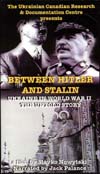- Between Hitler and Stalin (film)
Infobox_Film
name = Between Hitler and Stalin

caption = Film poster
director =Slavko Nowytski
producer =Slavko Nowytski
writer =Kristi Wheeler
starring =
music =
storyline =Wsevolod W. Isajiw
narrator =Jack Palance
editing =
distributor =Ukrainian Canadian Research and Documentation Centre
released = 2003 (Canada )
runtime = 58 min.
language = English
budget = |Between Hitler and Stalin: Ukraine in World War II is a 2003 film produced and directed by
Slavko Nowytski and narrated byJack Palance . The one-hour documentary, part black-and-white and part color, is a project ofUkrainian Canadian Research and Documentation Centre - an attempt to tell the story of theSecond World War from a Ukrainian perspective.In a chronological manner, Nowytski's film unfolds during the years of Soviet-Nazi collaboration recounting the losses and suffering of the Ukrainian people; the documentary shifts to the destruction wrought by
Stalin 's scorched earth policy as theSoviet Union military retreated, and shows the ruins left behind by the German and then the Soviet offensives.Zakydalsky, Oksana. [http://www.ukrweekly.com/Archive/2003/450303.shtml Documentary "Between Hitler and Stalin" offers untold story of Ukraine] . "The Ukrainian Weekly." 9 November 2003, No. 45, Vol. LXXI.]"Between Hitler and Stalin" describes the activity of the underground resistance movements, and specifically the long and large-scale struggle of the
Ukrainian Insurgent Army (UPA) on two fronts - against both totalitarian powers - for Ukraine's independence. As Oksana Zakydalsky writes forThe Ukrainian Weekly : "although [World War II is] often called the Russo-German war or described as Russia at war, only parts of Russia were occupied, while all Ukrainian territories were invaded and laid waste by both the Nazi and Soviet war machines...The film documents Ukraine's contribution to the war against totalitarianism and the price Ukraine paid for its independence."For historical and political commentary, the film relies on:
Norman Davies , a historian fromUniversity of London ;Robert Conquest , a Soviet scholar atHoover Institute ; John Armstrong, an insurgency expert, andZbigniew Brzezinski former US National Security Adviser.References
Wikimedia Foundation. 2010.
